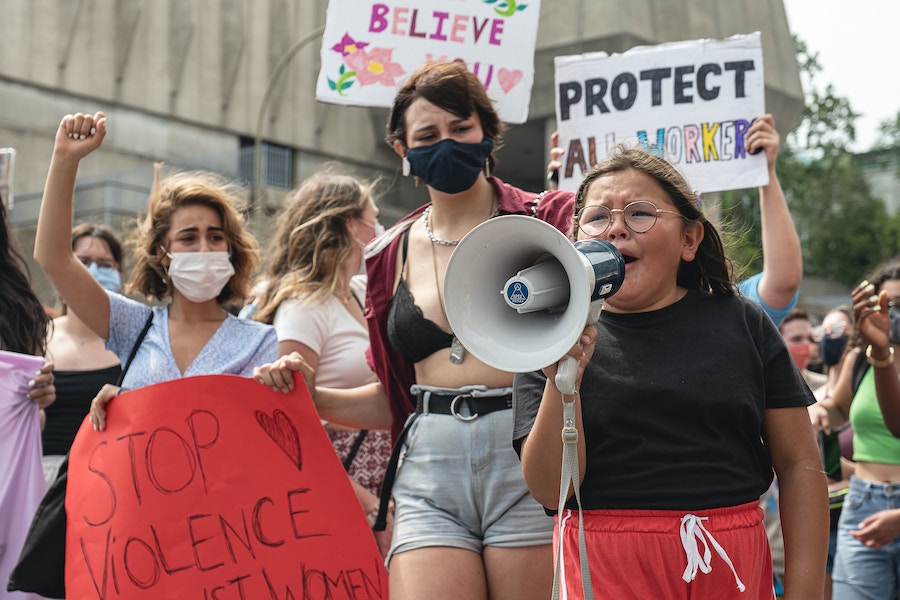At 17 years old, Chuying Huo has some serious activist wins under her belt.
A high school student in Ontario, Huo advocates against factors leading to eating disorders, rates of which are skyrocketing among her peers. Partnering with a research incubator at Harvard University, Huo’s work has led to bills introduced in five American states that would ban the sale of weight-loss pills, muscle-building pills, or both, to minors. And that’s not to mention her advocacy for access to education, working with the United Nations Girls’ Education Initiative’s Transform Education campaign.
You may unsubscribe from any of our newsletters at any time.
But young activists like Huo are under threat, according to new research by Plan International, a global nongovernmental organization focused on children’s rights and girls’ equality.
In a recently released report, the organization found 53 percent of Canadian young women have feared for their safety when participating in activism. Thirty-nine percent of young Canadian activists surveyed have faced harassment, whether that’s online trolling, bullying, physical violence or otherwise.
Meanwhile, in Plan International’s global report surveying 840 women and girl activists, 17 percent of girl and young women activists have felt unsafe, a quarter said they’ve felt psychologically unwell or anxious during their activism, and 61 percent have faced negative consequences from engaging in activism.
Since Huo’s activism largely takes place in government settings, she mostly avoids outright harassment, but not entirely. She’s experienced some social media backlash to her anti-diet industry work and even witnessed an activist friend receive verbal harassment from an official at a global forum. Plan International’s Canadian research found that eight in 10 young women activists have witnessed harassment of other activists, and of those, 79 percent said that “discourages their motivation.”
“We need these young women,” says Lindsay Glassco, president and chief executive officer of Plan International Canada. “Girl activists have just played such a significant role in recent years in leading movements and demonstrating huge passion around social change.” She cites Swedish climate activist Greta Thunberg, Pakistani girls’ education activist Malala Youszafai, and Anishinaabe Indigenous rights defender Autumn Peltier here in Canada.
More on Broadview:
- Gun reform advocate on surviving mass shooting — and why her generation lives in fear
- Sixties Scoop survivor creates an interactive map for fellow Indigenous adoptees
- Why anti-LGBTQ2S+ protests are hurting racialized trans and queer people in faith communities
And the research backs this up: 61 percent of activists globally said they’ve been able to create change through their activism that met or exceeded their expectations. Ninety-five percent said activism has had a positive effect on them as people.
Still, some experts say the backlash and harassment young women and girl activists face has been ramping up — and could have devastating effects on gender justice activism in years to come.
“For the first time in my career as an advocate, I am having young trans and queer people pass intentionally on any advocacy that has a public-facing component because they are afraid for their safety or that of their friends [and] their family,” says Fae Johnstone, the president of Momentum, a nonprofit advocating for social and gender justice for 2SLGBTQIA+ people.
“There is an awareness in [the] community that if you speak out… or if you’re vocal in your community, there is a high risk that you will be the next victim. And…when you’re targeted once, it sets the stage for you to be targeted again and again.”
Johnstone is speaking from personal experience. Earlier this year, she was the target of vitriol after appearing in a Hershey Canada International Women’s Day campaign and speaking at a YWCA Regina conference. After both moments in the spotlight, transphobes sent Johnstone threats, ridiculed her appearance, dug up pre-transition photos of her — Johnstone is a trans woman — and insisted on publicly addressing her by her ‘dead name,’ or the name she used before transitioning. At 28 years old and with a strong network of supporters, Johnstone says she can handle it, but worries for younger trans rights and gender justice activists who might face similar harassment.
She calls it a “chilling effect” on gender justice activism. Plan International credits this at least in part to a growing, global anti-rights movement, which, writes chief executive officer Stephen Omolio in the opening of the report, “is pushing back on hard-won gains in areas such as sexual and reproductive health and rights including safe abortions, LGBTQIA+ rights and comprehensive sexuality education.” (Meanwhile, gender- and sexuality-related causes make up the majority of what the girls and young women focus their activism on, according to Plan International’s research.)
Johnstone says, in addition to other inventions, governments “can invest in public education on the local level to make sure that we’re nipping this hate in the bud.”
For Huo, the solution is community: “I think that the really important thing for society as a whole to support youth activists and make sure that they feel safe is creating more mentorship programs.”
She says having older, experienced activists as mentors available for advice is crucial when facing backlash or harassment.
For many years, governments and civil society alike have encouraged girls and young women to speak up and engage in political spaces, but without measures to protect them from harassment, says Glassco, “we’re not really setting up an environment or the safe spaces for girls to do this.”
***
Kylie Adair is a freelance journalist based in Montreal.















Bravo to Kaylie Adair! I want to read more!